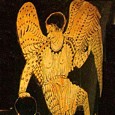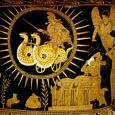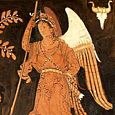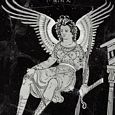QUOTE from http://www.theoi.com/Daimon/Poine.html
POINE (or Poena) was spirit (daimona) of retribution, vengeance, recompense, punishment and penalty for the crime of murder and manslaughter. The word poinêalso referred to the bloodmoney paid to the victim's family to expiation the crime of murder. She was sometimes pluralized into multiple Poinai.
Poine was closely connected with Praxidikethe "Exacter of Justice." Like that daimonashe was sometimes described as the mother of the Erinyes, goddesses concerned with avenging filial crimes.
Apollon once sent a Drakon-formed Poine to punish the Argives for the death of his infnat son Linos. of Argos.
| PARENTS |
| AITHER & GAIA (Hyginus Preface) |
| OFFSPRING |
| THE ERINYES (Valerius Flaccus 1.796) |
Aeschylus, Libation Bearers 937 ff (trans. Weir Smyth) (Greek tragedy C5th B.C.) :
"As to Priamos (Priam) and his sons justice (dikê) came at last in crushing retribution (poina), so to Agamemnon's house came a twofold lion, twofold slaughter."
"As to Priamos (Priam) and his sons justice (dikê) came at last in crushing retribution (poina), so to Agamemnon's house came a twofold lion, twofold slaughter."
Aeschylus, Libation Bearers 947 ff :
"And he [Orestes] has come whose part is the crafty vengeance (poina) of stealthy attack [on Aigisthos], and in the battle his hand was guided by her who is in very truth daughter of Zeus, breathing murderous wrath on her foes. We mortals aim true to the mark when we call her Dike (Justice)."
"And he [Orestes] has come whose part is the crafty vengeance (poina) of stealthy attack [on Aigisthos], and in the battle his hand was guided by her who is in very truth daughter of Zeus, breathing murderous wrath on her foes. We mortals aim true to the mark when we call her Dike (Justice)."
Strabo, Geography 3. 5. 11 (trans. Jones) (Greek geographer C1st B.C. to C1st A.D.) :
"[The Kassiterides islands near Spain] are inhabited by a people who wear black cloaks, go clad in tunics that reach to their feet, wear belts around their breasts, walk with canes, and resemble the goddesses Poinai (Poenae, Vengeances) in tragedies."
"[The Kassiterides islands near Spain] are inhabited by a people who wear black cloaks, go clad in tunics that reach to their feet, wear belts around their breasts, walk with canes, and resemble the goddesses Poinai (Poenae, Vengeances) in tragedies."
Pseudo-Hyginus, Preface (trans. Grant) (Roman mythographer C2nd A.D.) :
"From Aether (Air) and Terra (Earth) [were born] : Dolor (Pain), Dolus (Guile), Ira (Rage), Luctus (Lamentation), Mendacium (Lies), Jusjurandum (Oath), Ultio (Vengeance), Intemperantia (Intemperance), Altercatio (Altercation), Oblivio (Forgetfulness), Socordia (Sloth), Timor (Fear), Superbia (Pride), Incestum (Incest), Pugna (Combat)."
[N.B. Ultio is the Latin name for the Greek Poena.]
"From Aether (Air) and Terra (Earth) [were born] : Dolor (Pain), Dolus (Guile), Ira (Rage), Luctus (Lamentation), Mendacium (Lies), Jusjurandum (Oath), Ultio (Vengeance), Intemperantia (Intemperance), Altercatio (Altercation), Oblivio (Forgetfulness), Socordia (Sloth), Timor (Fear), Superbia (Pride), Incestum (Incest), Pugna (Combat)."
[N.B. Ultio is the Latin name for the Greek Poena.]
Valerius Flaccus, Argonautica 1. 796 ff (trans. Mozley) (Roman epic C1st A.D.) :
"[Aeson and Alkimede summon the Erinyes (Furies) to avenge themselves on King Pelias:] ‘Thou, O maid [Dike lady Justice], that dost report guilty deeds to Jove [Zeus], who lookest down upon earth with unerring eyes, ye avenging goddesses [Erinyes], thou Divine Law, and thou Poena (Retribution), aged mother of the Furiae [Erinyes], enter into the sinful palace of the king [Pelias], and bring upon him your fierce torches. Let accursed fear ravish his maddened heart; nor let him deem that my son alone will come with grim weapons in his bark [and take vengeance on the king].’"
"[Aeson and Alkimede summon the Erinyes (Furies) to avenge themselves on King Pelias:] ‘Thou, O maid [Dike lady Justice], that dost report guilty deeds to Jove [Zeus], who lookest down upon earth with unerring eyes, ye avenging goddesses [Erinyes], thou Divine Law, and thou Poena (Retribution), aged mother of the Furiae [Erinyes], enter into the sinful palace of the king [Pelias], and bring upon him your fierce torches. Let accursed fear ravish his maddened heart; nor let him deem that my son alone will come with grim weapons in his bark [and take vengeance on the king].’"
Valerius Flaccus, Argonautica 7. 147 ff :
"Orestes, his mind disordered by the Poenae (Vengeances) and blind fears, seizes a sword and slashes at this fierce mother's armed bands [his mother Klytemnaistra, who had conspired to slay Orestes' father]: 'tis himself the snakes are stinging, himself on whom the horrid-sounding lash is wreaking its ire, and once more in fancy he pursues the Laconian harlot [Klytemnestra], all hot to slay her; and wearily doth he return from the imagined slaughter of the goddesses, and fall upon the neck of his unhappy sister [Elektra]."
"Orestes, his mind disordered by the Poenae (Vengeances) and blind fears, seizes a sword and slashes at this fierce mother's armed bands [his mother Klytemnaistra, who had conspired to slay Orestes' father]: 'tis himself the snakes are stinging, himself on whom the horrid-sounding lash is wreaking its ire, and once more in fancy he pursues the Laconian harlot [Klytemnestra], all hot to slay her; and wearily doth he return from the imagined slaughter of the goddesses, and fall upon the neck of his unhappy sister [Elektra]."
Statius, Thebaid 8. 25 ff (trans. Mozley) (Roman epic C1st A.D.) :
"The lord of Erebus [Haides], enthroned in the midst of the fortress of his dolorous realm, was demanding of his subjects the misdoings of their lives, pitying nought human but wroth against all the Manes (Shades). Around him stand the Furiae [Erinyes, Furies] and various Mortes [Thanatoi, Deaths] in order due, and savage Poena (Vengeance) thrusts forth her coils of jangling chains."
[N.B. Statius uses the Greek name Poena for the spirit of vengeance. The other personifications are Latin.]
"The lord of Erebus [Haides], enthroned in the midst of the fortress of his dolorous realm, was demanding of his subjects the misdoings of their lives, pitying nought human but wroth against all the Manes (Shades). Around him stand the Furiae [Erinyes, Furies] and various Mortes [Thanatoi, Deaths] in order due, and savage Poena (Vengeance) thrusts forth her coils of jangling chains."
[N.B. Statius uses the Greek name Poena for the spirit of vengeance. The other personifications are Latin.]
|
|
|
|
- Aeschylus, Libation Bearers - Greek Tragedy C5th B.C.
- Strabo, Geography - Greek Geography C1st B.C. - C1st A.D.
- Hyginus, Fabulae - Latin Mythography C2nd A.D.
- Valerius Flaccus, The Argonautica - Latin Epic C1st A.D.
- Statius, Thebaid - Latin Epic C1st A.D.
Other references not currently quoted here: Tacitus Annals 3.18; Cicero Pusonem 37,91; Cicero Cluentio 61, 171; Lucanas 6.695






No comments:
Post a Comment